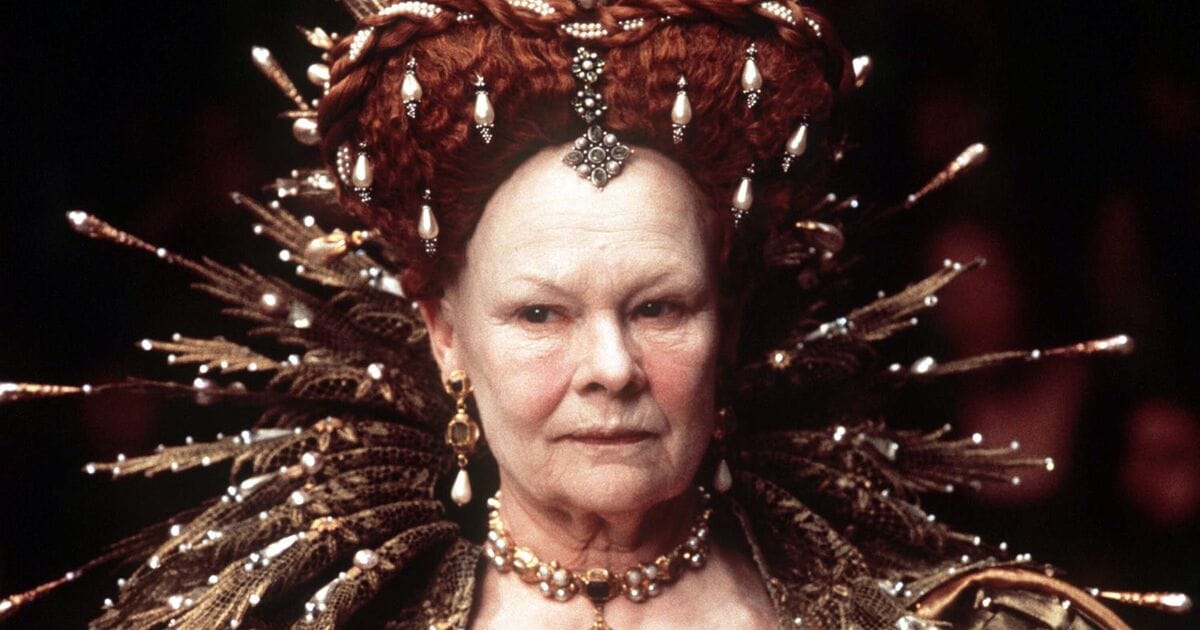
Judi Dench as Queen Elizabeth I in the 1999 film Shakespeare in Love (Image: Getty Images)
To be, or not to be? That is the existential question faced by Shakespeare in America – a land that has fallen out of love with the Bard of Avon. Britain’s greatest playwright has been performed across the world in more than 100 languages, spawned hundreds of film adaptations, and continues to be staged 408 years after his death.
Even today, his plays teach ageless lessons about power, ambition and love, while captivating audiences with timeless prose, dark tragedies, historic dramas and sharp-tongued comedies. But Shakespeare’s sometimes archaic language, iambic pentameter and non-PC characters have put his popularity in a tailspin.
In Britain last month, renewed calls to scrap Shakespeare from school curriculums were rejected by Education Secretary Bridget Phillipson, and his plays are still regularly staged across this sceptred isle… for now.
In America, however, the nation ‘discovered’ only 72 years before Shakespeare’s birth, his plays are disappearing from American stages, assailed for being too contentious, too white, and too sexist for a populace that increasingly gets its news from TikTok and finds instant gratification too slow.
US theatres and academics alike are asking: Is Shakespeare being cancelled? And why is America so afraid of Shakespeare?

Sir Ian McKellen as Hamlet at the Theatre Royal Windsor in Berkshire (Image: Elliott Franks)
“I’m calling it the Great Shakespeare Shrinkage,” says English professor Ayanna Thompson of Arizona State University, also a member of Britain’s Royal Shakespeare Company’s board. “There are whole swaths of the US where you cannot see Shakespeare in a given year.”
American theatres are “running away from Shakespeare,” agrees Drew Lichtenberg, artistic producer at the Shakespeare Theatre Company in Washington, D.C.
Only 40 major professional productions of the Bards’ plays were performed in the US in the past year, less than half the 96 put on five years earlier. Theatres that once only staged Shakespeare’s plays now include him in as little as one fifth of their repertory.
The Hudson Valley Shakespeare Festival in upstate New York staged three productions this summer – none by the Bard.
The nation’s largest classical company, the 89-year-old Oregon Shakespeare Festival, staged only two plays by the Bard among this year’s ten productions.
The RSC’s long history of bringing Shakespeare to Broadway has long run dry: it last took the Bard to the Great White Way in 1996. This year they only got within 800 miles of it, travelling to the Chicago Shakespeare Theatre in Illinois, where the RSC is staging Pericles, transferred from its Stratford-upon-Avon base.
It’s not that Shakespeare is irrelevant, though contemporary US audiences increasingly struggle with the Bard’s arcane English.

William Shakespeare is viewed as ‘problematic’ by young, woke audiences (Image: Getty Images)
Americans may share the concerns of Harris Westminster school’s head of English Freddie Baveystock, who recently proposed dropping the Bard from British school curriculum, warning that teenagers were being “turned off” from studying literature by “forcing them to read an entire Shakespeare play.”
The poet of Avon is suffering the slings and arrows of outrageous critics.
A growing number of America’s ‘woke’ academics have refused to teach Shakespeare in schools, arguing that he promotes sexism, racism, white supremacy and intolerance. Yale University students petitioned the college to “decolonise” and drop Shakespeare as a requirement in 2016.
An army of school librarians openly dumped the likes of Macbeth and Hamlet in 2021.
Amanda MacGregor of Minnesota, writing in the School Library Journal, argued: “Shakespeare’s works are full of problematic, outdated ideas, with plenty of misogyny, racism, homophobia, classism, anti-Semitism and misogynoir” – the latter, a hatred of black women.
America’s regional theatres, still struggling to recover from the pandemic shutdown, are increasingly focused on race, social justice and woke ideology, either abandoning Shakespeare or trying to reinvent him, turning away audiences seeking entertainment rather than a lecture.
Many recent productions have politicised the Bard’s work to comment on current politics, only to become entangled in controversy. One New York production of Julius Caesar depicted a Donald Trump-like Roman Emperor being assassinated, prompting corporate sponsors to abandon the theatre.
There have been calls for racial and gender inclusivity in theatre casting, and ‘woke’ politics have made it difficult for theatres to stage Taming Of The Shrew, Othello, The Tempest or The Merchant of Venice. Romeo & Juliet’s teen sex and lovers’ suicides have made it a dubious choice for schools concerned for vulnerable young minds.
“Shakespeare is under assault from the progressive left” and “has become increasingly polarised,” says Lichtenberg, citing the activist group We See You, White American Theatre, which demanded a “bare minimum of 50 per cent BIPOC [Black, Indigenous and People of Colour] representation in programming and personnel”.

The reconstructed Shakespeare’s Globe theatre on the South Bank of the Thames in London (Image: Getty Images/iStockphoto)
The Bard’s plays “remained the white, male, European elephant in the room,” Lichtenberg told The New York Times. “The disputes over Shakespeare are intense, even scary.”
The Oregon Shakespeare Festival’s first black artistic director, Nataki Garrett, quit last year amid racist death threats after trying to diversify the company’s cast and crew. The group recently staged Coriolanus with a cast of female and non-binary actors.
The exorbitant cost of staging Shakespeare productions is also hastening his disappearance from US theatres, which favour cheaper one-person shows, reliable money-spinning musicals, and classic whodunnits.
“Agatha Christie is single-handedly saving the American regional theatre,” claims one artistic director.
Shakespeare may have shuffled off his mortal coil, but he is not dead in America – yet.
Hollywood casting is luring audiences to Broadway, where Romeo and Juliet currently features West Side Story remake star Rachel Zegler opposite Heartstopper’s British hunk Kit Connor, and Kenneth Branagh is starring Off Broadway in King Lear. Denzel Washington and Jake Gyllenhaal will costar next year in Othello on Broadway – the play’s first revival there since 1982 – which will be a huge test of American audiences’ appetite for culturally challenging Shakespeare.
The Bard continues to be taught at US schools – he is the only author mandated by the Common Core State Standards for English – but is often viewed as an incomprehensible chore.
Yet theatre aficionados stress that American audiences need to be educated in how to appreciate Shakespeare’s literary works, if his plays are to endure against the assault of social media producing ever-diminishing attention spans.
“If Shakespeare is to survive, it won’t be through star-studded Broadway shows, exciting as those productions may be,” says Daniel Blank, director of the Free Library of Philadelphia Foundation. “It will be through productions in schools and colleges, in public parks and in parking lots, that introduce Shakespeare’s plays to new audiences and imagine anew the characters and the stories that have captivated us for centuries.”
At least in Britain, Education Secretary Phillipson assures schools: “Shakespeare is staying put. He is one of our most celebrated writers and his works will proudly remain a fixture in our classrooms for every child to study.”
Bestselling author Jim Rickards cautioned against schools “flushing great literature down the drain”. And as Dame Judi Dench said on The Graham Norton Show: “We quote Shakespeare all the time, perhaps without knowing it. You only have to go to those plays, and be in any kind of those situations – being in love, or being jealous, or being angry or being whatever. And you will find that there is a way of him summing up that is completely sufficient for what your emotion is.”
Adds Lichtenberg: “We need Shakespeare, especially in moments of conflict and unrest. Theatres owe audiences a chance to reclaim him, in all his blood and guts.”
Or might Shakespeare, the long-time reigning monarch of English literature, have perhaps foreseen his own cultural demise? As the King says in Henry IV, Part 2: “Uneasy lies the head that wears a crown.”







